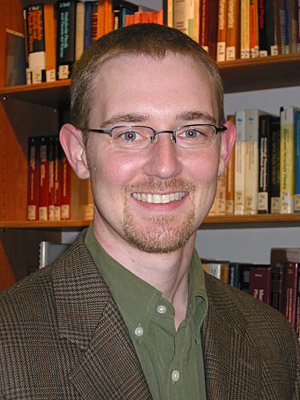
Presidential honor
UD alumnus Kitchin selected to receive prestigious PECASE
10:08 a.m., July 30, 2012--John R. Kitchin, a University of Delaware alumnus and associate professor of chemical engineering at Carnegie Mellon University, has been selected a recipient of the prestigious Presidential Early Career Award for Scientists and Engineers (PECASE).
PECASE is the highest honor bestowed by the U.S. government on scientists and engineers in the early stages of their independent research careers.
Honors Stories
National Medal of Science
Warren Award
Kitchin is the one of two UD alumni to have been named PECASE recipients in 2012. Also honored was Joshua S. Figueroa, an assistant professor of chemistry and biochemistry at the University of California San Diego.
Kitchin, an associate professor in Carnegie Mellon's Department of Chemical Engineering with a courtesy appointment in the Department of Materials Science and Engineering, was nominated for PECASE by the Department of Energy’s Office of Fossil Energy for his research efforts in collaboration with the National Energy Technology Lab’s Regional University Alliance (NETL-RUA), an alliance of five universities that conduct fully integrated basic and applied energy and environmental research.
"I am honored to be selected as a PECASE recipient for our work in electrochemical oxygen separation and carbon dioxide capture technologies," Kitchin said. "I am especially grateful to the NETL Regional University Alliance, which supported this work and continues to provide a unique environment to develop carbon dioxide capture enabling and clean energy technologies."
In this work, Kitchin and his team developed an electrochemical separation method for separating oxygen from air at ambient pressure and temperature. Cheap, efficient oxygen production is critical for several clean energy and carbon dioxide capture technologies of the future. Traditional air separation methods require extreme refrigeration to turn air into liquid that can be distilled, which is very energy intensive. Another alternative uses extremely high temperatures and pressures to selectively drive oxygen through ceramic membranes.
"Our approach uses electrochemistry to reversibly convert oxygen in air to ions, transport the ions across a membrane, and convert the ions back to pure oxygen on the other side of the membrane," Kitchin said. "All this can be done at room temperature and ambient pressure. We continue to develop catalysts to make this process more efficient and economical."
He added that the technology has applications in other areas as well, including electrochemical production of fuels and chemicals and small scale oxygen production for medical applications.
About John R. Kitchin
John R. Kitchin received a bachelor’s degree in chemistry from North Carolina State University in 1996 then went to work as a chemist for Lord Corp., developing new magnetorheological fluids and applications.
Kitchin returned to academics and enrolled at the University of Delaware, from which he received a master's degree in materials science and engineering in 2002 and a doctorate in chemical engineering in 2004.
Kitchin was selected as an Alexander von Humboldt postdoctoral fellow at the Fritz Haber Institut der Max Planck Gesellschaft in Berlin from 2004-05 and joined Carnegie Mellon University as an assistant professor in 2006. He was a Resident Institute Fellow at the National Energy Technology Laboratory in 2007 and the following year became the leader of the carbon management thrust area for NETL.
An innovative researcher and educator, Kitchin received the Kun Li Award for Excellence in Education in 2010 and won a five-year, $750,000 grant from the U.S. Department of Energy in 2010 to develop new materials for producing hydrogen and oxygen from water using electrochemistry.
Kitchin returned to UD to present the Department of Chemical Engineering's Allan P. Colburn Memorial Lecture, on "Oxygen Evolution on Multicomponent Oxide Electrocatalysts," in March 2011.
"My time at UD uniquely prepared me for the work we currently do," Kitchin said. "My undergraduate degree is in chemistry. After graduating, I wanted to change fields to engineering, and UD made that possible. I transitioned from chemistry to materials science to chemical engineering, and UD was the only school that would let me do that.
"It has been the breadth of this education that enables our research, which uses quantum chemistry calculations to predict the reactivity of electrocatalysts as well as electrocatalyst synthesis and oxygen separation device construction. We span basic science to engineering analysis of the applications we study. The PECASE award is a testament to the breadth and depth of education I got at UD."
Comments from professors
While at UD, Kitchin was advised by Mark Barteau, senior vice provost for research and strategic initiatives and Robert L. Pigford Chair of Chemical Engineering, and Jingguang Chen, Claire D. LeClaire Professor of Chemical Engineering.
"The PECASE is one of the most prestigious awards that a young faculty member can receive – after all, how many others come with an invitation to the White House?" Barteau said of the honor. "It reflects excellence in research but also a commitment to education. John’s trajectory was readily apparent in his student career – charting with his degrees a path through chemistry, materials science and chemical engineering; performing outstanding experimental and theoretical research on new catalytic materials that continues to be very highly cited; organizing grad student workshops on academic career paths; and challenging the conventional wisdom -- including that of his advisers -- as the very best do. It was an honor to be associated with his formative years as a Ph.D. student, and I look forward to even greater accomplishments and recognition for him in the future."
Said Chen, "John was one of the most hard-working and creative graduate students. He has brought his work ethic and creativity to CMU and established a very successful research group. I am really glad that his ground-breaking work is recognized by the PECASE award."
Article by Neil Thomas








